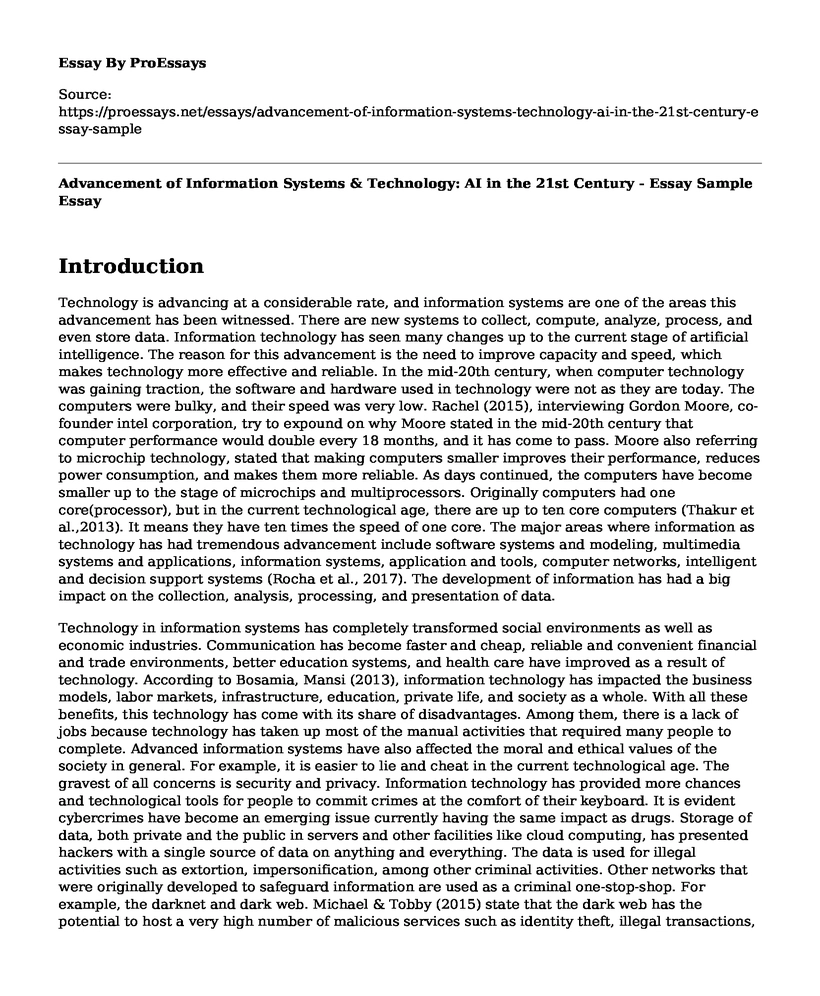Introduction
Technology is advancing at a considerable rate, and information systems are one of the areas this advancement has been witnessed. There are new systems to collect, compute, analyze, process, and even store data. Information technology has seen many changes up to the current stage of artificial intelligence. The reason for this advancement is the need to improve capacity and speed, which makes technology more effective and reliable. In the mid-20th century, when computer technology was gaining traction, the software and hardware used in technology were not as they are today. The computers were bulky, and their speed was very low. Rachel (2015), interviewing Gordon Moore, co-founder intel corporation, try to expound on why Moore stated in the mid-20th century that computer performance would double every 18 months, and it has come to pass. Moore also referring to microchip technology, stated that making computers smaller improves their performance, reduces power consumption, and makes them more reliable. As days continued, the computers have become smaller up to the stage of microchips and multiprocessors. Originally computers had one core(processor), but in the current technological age, there are up to ten core computers (Thakur et al.,2013). It means they have ten times the speed of one core. The major areas where information as technology has had tremendous advancement include software systems and modeling, multimedia systems and applications, information systems, application and tools, computer networks, intelligent and decision support systems (Rocha et al., 2017). The development of information has had a big impact on the collection, analysis, processing, and presentation of data.
Technology in information systems has completely transformed social environments as well as economic industries. Communication has become faster and cheap, reliable and convenient financial and trade environments, better education systems, and health care have improved as a result of technology. According to Bosamia, Mansi (2013), information technology has impacted the business models, labor markets, infrastructure, education, private life, and society as a whole. With all these benefits, this technology has come with its share of disadvantages. Among them, there is a lack of jobs because technology has taken up most of the manual activities that required many people to complete. Advanced information systems have also affected the moral and ethical values of the society in general. For example, it is easier to lie and cheat in the current technological age. The gravest of all concerns is security and privacy. Information technology has provided more chances and technological tools for people to commit crimes at the comfort of their keyboard. It is evident cybercrimes have become an emerging issue currently having the same impact as drugs. Storage of data, both private and the public in servers and other facilities like cloud computing, has presented hackers with a single source of data on anything and everything. The data is used for illegal activities such as extortion, impersonification, among other criminal activities. Other networks that were originally developed to safeguard information are used as a criminal one-stop-shop. For example, the darknet and dark web. Michael & Tobby (2015) state that the dark web has the potential to host a very high number of malicious services such as identity theft, illegal transactions, and human trafficking.
References
Bosamia M (2013). Positive and Negative Impacts of Information and Communication Technology in our Everyday Life.
Michael C & Tobby, Simon(2015). The impact of the dark web on internet governance and cybersecurity. https://www.cigionline.org/sites/default/files/gcig_paper_no6.pdf
Thakur, Shivam & RAI, HARI & Kumar, Sidharth & Pawar, Suman. (2013). Factors Determining the Speed and Efficiency of a Micro-Processor in a PC. International Journal of Emerging Trends in Electrical and Electronics (IEEE-ISSN: 2320-9569). 9.
Rocha, A & Correia, Ana Maria & Adeli, Hojjat & Reis, Luis & Costanzo, Sandra. (2017). Recent Advances in Information Systems and Technologies: Volume 2. 10.1007/978-3-319-56538-5. https://www.researchgate.net/publication/321529381_Recent_Advances_in_Information_Systems_and_Technologies_Volume_2
Rachel C (2015) Gordon Moore: The Man Whose Name Means Progress. https://spectrum.ieee.org/computing/hardware/gordon-moore-the-man-whose-name-means-progress
Cite this page
Advancement of Information Systems & Technology: AI in the 21st Century - Essay Sample. (2023, May 22). Retrieved from https://proessays.net/essays/advancement-of-information-systems-technology-ai-in-the-21st-century-essay-sample
If you are the original author of this essay and no longer wish to have it published on the ProEssays website, please click below to request its removal:
- Essay on Smartphone Encryption and Privacy
- Why iPhones Are a Bad Purchase Compared to Other Smartphones Essay Example
- Essay Sample on Driverless Cars: The Future of Shared Transportation
- Article Analysis Essay on Moped Enabled Mobile Phone Snatches
- Renewable Energy: A Necessary Resource for Sustainability - Essay Sample
- How Does Mobile Phone Use Impact Reaction Times? - Essay Sample
- Research Paper Sample on Unlock Student Potential With Innovative Teaching: A Study of Biology Learning







